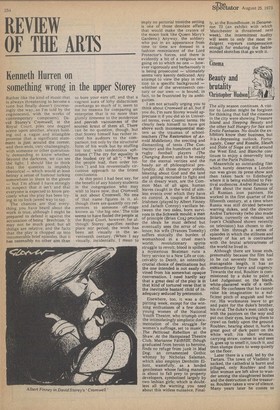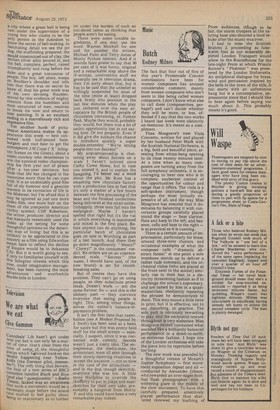Cinema
Beauty and brutality
ChristopherHudson
The silly season continues. A visitor to London might be forgiven for thinking that half the cinemas in the city were showing Treasure Island and Sleeping Beauty and the other half Hungry for Sex and Erotic Fantasies. No doubt the exhibitors know their business, but it is a depressing outlook. Fortunately, Cesar and Rosalie, Sleuth and State of Siege are still around the West End, and Blanche continues to enjoy a deservedly long run at the Paris Pullman.
Meanwhile an outstanding film which surely deserves a London run was given its press show and then taken back to Edinburgh where it is being exhibited to Festival audiences. Andrei Roublev is a film about the most famous of all Russian icon painters. He worked in the first quarter of the fifteenth century, at a time when Russia was still divided between warring dukes, and the director Andrei Tarkovsky (who also made Solaris, currently on release, and Ivan's Childhood shown recently on television) has chosen to describe him through a series of episodes in which the stillness and beauty of his art is contrasted with the brutal arbitrariness of the world he lived in.
Although there are loose ends, presumably because the film had to be cut severely from its unmanageable length, it has an extraordinary force and cogency. Towards the end, Roublev is commissioned by a duke to paint a Last Judgement on the blank, white-plastered walls of a cathedral. He confesses that he cannot raise his imagination to a sufficient pitch of anguish and horror. His workmates leave to go and paint for the duke's brother, his rival. The duke's men catch up with the painters on the way and put out their eyes, leaving them to crawl on feebly upon the ground. Roublev, hearing about it, hurls a great gout of dark paint on the white wall. H is idiot woman, carrying straw, comes in and sees it, goes up to smell it, touch it, and then slumps down to weep quietly on the floor.
Later there is a raid, led by the Tartars. The town of Vladimir is sacked, the cathedral is burnt and pillaged, only Roublev and his idiot woman are left alive to wander among the slaughtered bodies and the destruction of the treasures. Roublev takes a vow of silence. Many years later he comes to
a city where a great bell is being cast under the supervision of a Young boy who claims to be the only person in the dukedom to know the secret of bell-making. In fascinating detail we. see the pit dug, the scaffolding prepared, the mould constructed out of clay, the molten silver alloy poured in, and the bell, complete, perfect, raised triumphantly and rung before the duke and a great concourse of People. The boy, left alone, weeps ort Roublev's shoulder and tells hitri that there was no secret he knew of, that his great work was of his own devising. Roublev, moved by this evidence of mighty creation from the humblest and most untutored of men, resolves to break his vow and return to Icon painting. It is an exultant ending to a marvellously rich and expressive film.
Vet another hunk of picturesque Americana makes its appearance this week — best consumed with half-pound hamburgers and root beer to get the atmosphere. ,T.W.Coop (' X ' Islington Screen on the Green), about a rodeo cowboy who determines to Win the national rodeo championship his first year out of prison after a ten-year sentence, but finds that life has changed in the meantime more than he can cope With, It is an undeniably good film full of sly humour and a genuine Warmth in its recreation of life in the Midwest; but I'm afraid that it May be ignored as just one more rodeo film, one more hair on the Chest of the ,composite American virility symbol. Cliff Robertson, the writer, producer, director and star,hasquite reasonably used the rodeo as' the setting for some thoughtful opinions on the American way of living: but this is as unlikely to be appreciated in this country as a film using Edwardian steam fairs to reflect the decline Of Empire would be in Arkansas City. But it is worth going to see, if only to familiarise yourself with this Islington cinema which this Year, under irriaginative management, has been running the most adventurous and worthwhile double bills in London.



































 Previous page
Previous page